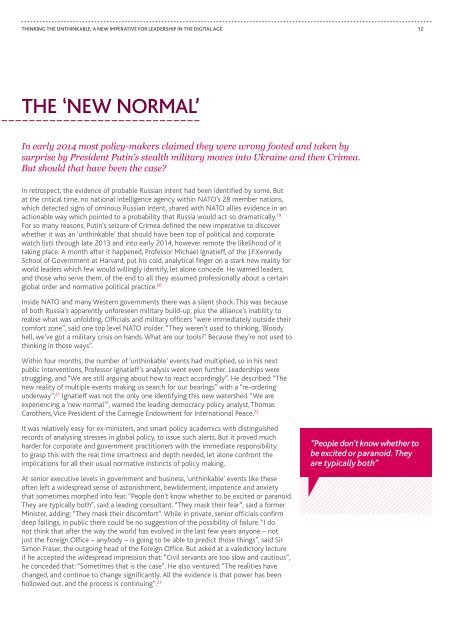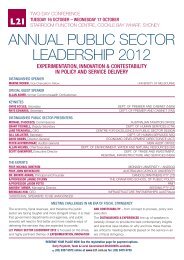Thinking the Unthinkable
Thinking-the-Unthinkable-cima-report
Thinking-the-Unthinkable-cima-report
You also want an ePaper? Increase the reach of your titles
YUMPU automatically turns print PDFs into web optimized ePapers that Google loves.
THINKING THE UNTHINKABLE; A NEW IMPERATIVE FOR LEADERSHIP IN THE DIGITAL AGE<br />
12<br />
THE ‘NEW NORMAL’<br />
In early 2014 most policy-makers claimed <strong>the</strong>y were wrong footed and taken by<br />
surprise by President Putin’s stealth military moves into Ukraine and <strong>the</strong>n Crimea.<br />
But should that have been <strong>the</strong> case?<br />
In retrospect, <strong>the</strong> evidence of probable Russian intent had been identified by some. But<br />
at <strong>the</strong> critical time, no national intelligence agency within NATO’s 28 member nations,<br />
which detected signs of ominous Russian intent, shared with NATO allies evidence in an<br />
actionable way which pointed to a probability that Russia would act so dramatically. 19<br />
For so many reasons, Putin’s seizure of Crimea defined <strong>the</strong> new imperative to discover<br />
whe<strong>the</strong>r it was an ‘unthinkable’ that should have been top of political and corporate<br />
watch lists through late 2013 and into early 2014, however remote <strong>the</strong> likelihood of it<br />
taking place. A month after it happened, Professor Michael Ignatieff, of <strong>the</strong> J.F.Kennedy<br />
School of Government at Harvard, put his cold, analytical finger on a stark new reality for<br />
world leaders which few would willingly identify, let alone concede. He warned leaders,<br />
and those who serve <strong>the</strong>m, of <strong>the</strong> end to all <strong>the</strong>y assumed professionally about a certain<br />
global order and normative political practice. 20<br />
Inside NATO and many Western governments <strong>the</strong>re was a silent shock. This was because<br />
of both Russia’s apparently unforeseen military build-up, plus <strong>the</strong> alliance’s inability to<br />
realise what was unfolding. Officials and military officers “were immediately outside <strong>the</strong>ir<br />
comfort zone”, said one top level NATO insider. “They weren’t used to thinking, ‘Bloody<br />
hell, we’ve got a military crisis on hands. What are our tools?’ Because <strong>the</strong>y’re not used to<br />
thinking in those ways”.<br />
Within four months, <strong>the</strong> number of ‘unthinkable’ events had multiplied, so in his next<br />
public interventions, Professor Ignatieff’s analysis went even fur<strong>the</strong>r. Leaderships were<br />
struggling, and “We are still arguing about how to react accordingly”. He described: “The<br />
new reality of multiple events making us search for our bearings” with a “re-ordering<br />
underway”. 21 Ignatieff was not <strong>the</strong> only one identifying this new watershed. “We are<br />
experiencing a ‘new normal’”, warned <strong>the</strong> leading democracy policy analyst, Thomas<br />
Caro<strong>the</strong>rs, Vice President of <strong>the</strong> Carnegie Endowment for International Peace. 22<br />
It was relatively easy for ex-ministers, and smart policy academics with distinguished<br />
records of analysing stresses in global policy, to issue such alerts. But it proved much<br />
harder for corporate and government practitioners with <strong>the</strong> immediate responsibility<br />
to grasp this with <strong>the</strong> real time smartness and depth needed, let alone confront <strong>the</strong><br />
implications for all <strong>the</strong>ir usual normative instincts of policy making.<br />
At senior executive levels in government and business, ‘unthinkable’ events like <strong>the</strong>se<br />
often left a widespread sense of astonishment, bewilderment, impotence and anxiety<br />
that sometimes morphed into fear. “People don’t know whe<strong>the</strong>r to be excited or paranoid.<br />
They are typically both”, said a leading consultant. “They mask <strong>the</strong>ir fear”, said a former<br />
Minister, adding: “They mask <strong>the</strong>ir discomfort”. While in private, senior officials confirm<br />
deep failings, in public <strong>the</strong>re could be no suggestion of <strong>the</strong> possibility of failure. “I do<br />
not think that after <strong>the</strong> way <strong>the</strong> world has evolved in <strong>the</strong> last few years anyone – not<br />
just <strong>the</strong> Foreign Office – anybody – is going to be able to predict those things”, said Sir<br />
Simon Fraser, <strong>the</strong> outgoing head of <strong>the</strong> Foreign Office. But asked at a valedictory lecture<br />
if he accepted <strong>the</strong> widespread impression that: “Civil servants are too slow and cautious”,<br />
he conceded that: “Sometimes that is <strong>the</strong> case”. He also ventured: “The realities have<br />
changed, and continue to change significantly. All <strong>the</strong> evidence is that power has been<br />
hollowed out, and <strong>the</strong> process is continuing”. 23<br />
“People don’t know whe<strong>the</strong>r to<br />
be excited or paranoid. They<br />
are typically both”



